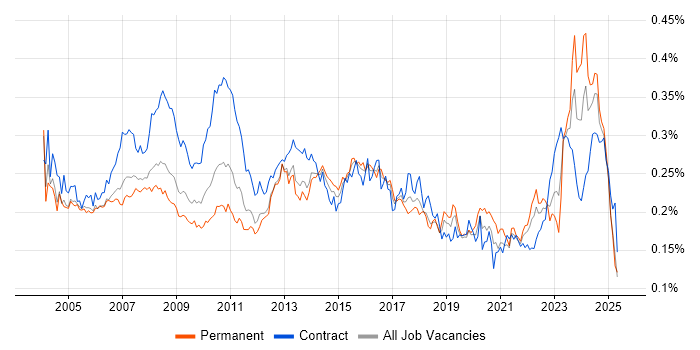Operations Analyst
UK > England
The median Operations Analyst salary in England is £58,750 per year, according to job vacancies posted during the 6 months leading to 18 May 2025.
The table below provides salary benchmarking and summary statistics, comparing them to the same period in the previous two years.
| 6 months to 18 May 2025 |
Same period 2024 | Same period 2023 | |
|---|---|---|---|
| Rank | 606 | 548 | 789 |
| Rank change year-on-year | -58 | +241 | +110 |
| Permanent jobs requiring an Operations Analyst | 87 | 291 | 133 |
| As % of all permanent jobs advertised in England | 0.18% | 0.34% | 0.15% |
| As % of the Job Titles category | 0.19% | 0.36% | 0.16% |
| Number of salaries quoted | 26 | 180 | 81 |
| 10th Percentile | £30,500 | £29,000 | £35,750 |
| 25th Percentile | £36,875 | £41,196 | £41,250 |
| Median annual salary (50th Percentile) | £58,750 | £48,500 | £50,000 |
| Median % change year-on-year | +21.13% | -3.00% | +11.11% |
| 75th Percentile | £76,563 | £59,063 | £61,250 |
| 90th Percentile | £88,750 | £80,000 | £67,500 |
| UK median annual salary | £57,500 | £48,500 | £50,000 |
| % change year-on-year | +18.56% | -3.00% | +11.11% |
All Permanent IT Job Vacancies
England
For comparison with the information above, the following table provides summary statistics for all permanent IT job vacancies in England. Most job vacancies include a discernible job title that can be normalized. As such, the figures in the second row provide an indication of the number of permanent jobs in our overall sample.
| Permanent vacancies in England with a recognized job title | 45,134 | 81,676 | 80,812 |
| % of permanent jobs with a recognized job title | 91.05% | 94.55% | 91.52% |
| Number of salaries quoted | 24,494 | 60,830 | 51,454 |
| 10th Percentile | £29,750 | £28,500 | £32,500 |
| 25th Percentile | £41,250 | £38,126 | £45,000 |
| Median annual salary (50th Percentile) | £56,500 | £53,000 | £60,800 |
| Median % change year-on-year | +6.60% | -12.83% | +1.33% |
| 75th Percentile | £75,000 | £71,250 | £82,500 |
| 90th Percentile | £97,500 | £90,000 | £100,000 |
| UK median annual salary | £56,000 | £52,500 | £60,000 |
| % change year-on-year | +6.67% | -12.50% | - |
Operations Analyst
Job Vacancy Trend in England
Job postings that featured Operations Analyst in the job title as a proportion of all IT jobs advertised in England.

Operations Analyst
Salary Trend in England
3-month moving average salary quoted in jobs citing Operations Analyst in England.
Operations Analyst
Salary Histogram in England
Salary distribution for jobs citing Operations Analyst in England over the 6 months to 18 May 2025.
Operations Analyst
Job Locations in England
The table below looks at the demand and provides a guide to the median salaries quoted in IT jobs citing Operations Analyst within the England region over the 6 months to 18 May 2025. The 'Rank Change' column provides an indication of the change in demand within each location based on the same 6 month period last year.
| Location | Rank Change on Same Period Last Year |
Matching Permanent IT Job Ads |
Median Salary Past 6 Months |
Median Salary % Change on Same Period Last Year |
Live Jobs |
|---|---|---|---|---|---|
| London | +55 | 33 | £65,000 | +18.18% | 103 |
| North of England | +41 | 26 | £36,250 | +16.94% | 15 |
| North West | +5 | 23 | £37,500 | +20.97% | 4 |
| South East | +74 | 13 | £57,500 | +27.78% | 28 |
| East of England | +30 | 5 | £24,990 | -11.54% | 4 |
| Midlands | -18 | 5 | £44,810 | -7.61% | 7 |
| West Midlands | -24 | 5 | £44,810 | -7.61% | 1 |
| South West | +75 | 4 | £37,500 | -22.68% | 1 |
| Yorkshire | +59 | 2 | - | - | 6 |
| North East | +33 | 1 | £35,000 | -6.67% | 5 |
| Operations Analyst UK |
|||||
Operations Analyst Skill Set
Top 30 Co-occurring Skills and Capabilities in England
For the 6 months to 18 May 2025, Operations Analyst job roles required the following skills and capabilities in order of popularity. The figures indicate the absolute number co-occurrences and as a proportion of all permanent job ads across the England region featuring Operations Analyst in the job title.
|
|
Operations Analyst Skill Set
Co-occurring Skills and Capabilities in England by Category
The follow tables expand on the table above by listing co-occurrences grouped by category. The same employment type, locality and period is covered with up to 20 co-occurrences shown in each of the following categories:
|
|
||||||||||||||||||||||||||||||||||||||||||||||||||||||||||||||||||||||||||||||||||||||||||||||||
|
|
||||||||||||||||||||||||||||||||||||||||||||||||||||||||||||||||||||||||||||||||||||||||||||||||
|
|
||||||||||||||||||||||||||||||||||||||||||||||||||||||||||||||||||||||||||||||||||||||||||||||||
|
|
||||||||||||||||||||||||||||||||||||||||||||||||||||||||||||||||||||||||||||||||||||||||||||||||
|
|
||||||||||||||||||||||||||||||||||||||||||||||||||||||||||||||||||||||||||||||||||||||||||||||||
|
|
||||||||||||||||||||||||||||||||||||||||||||||||||||||||||||||||||||||||||||||||||||||||||||||||
|
|
||||||||||||||||||||||||||||||||||||||||||||||||||||||||||||||||||||||||||||||||||||||||||||||||
|
|
||||||||||||||||||||||||||||||||||||||||||||||||||||||||||||||||||||||||||||||||||||||||||||||||
|
|||||||||||||||||||||||||||||||||||||||||||||||||||||||||||||||||||||||||||||||||||||||||||||||||
